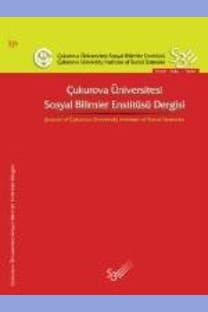Türkiye'de Sanayileşme ve Temel Göstergeler Açısından Sanayinin Gelşimi
Bu çalışma, iki temel amaca yöneliktir. Birinci amaç, Türkiye'nin sanayileşme deneyimini son yirmi yıl üzerinde yoğunlaşarak ana hatlarıyla değerlendirmek, gerçekleştirilen üretim artışının ve yapısal değişimin boyutlarını ve başlıca kırılma noktalarını belirlemek ve kısa dönem krizlerin bu süreç üzerindeki etkisini izlemektir. Yine bu bağlamda bir diğer amaç, Türkiye'nin sanayileşme performansını üretim, yatırım, istihdam, katma değer artışı, dış ticaret, teknolojik gelişme ve verimlilik gibi temel göstergeler ışığında değerlendirmektir.
The main objective of this paper is to evaluate the experience of Turkey's industrialization by focusing on output growth and structural change and to asses the impact of the short term economic crisis on this key variables, especially for the last two decades. In this context, this study also investigates the performance of Turkey's industrialization in the light of important key indicators such as output, investment, employment, foreign trade, value-added growth and technological developments.
___
- Angle, H., Perry, J. (1981), "An Empirical Assessment of Organizational Commitment and Organizational Effectiveness", Administrative Science Quarterly, 26: 1-14.
- Aven, F.F., Parker, B., McEnvoy, G.M. (1993), "Gender and Attitudinal Commitment to Organizations: A Meta Analysis", Journal of Applied Psychology, 72: 642-648.
- Balay, R. (2000), Yönetici ve Öğretmenlerde Örgütsel Bağlılık, Ankara: Nobel Yayın Dağıtım.
- Bolat, O. (2000), Konaklama İşletmelerinde İşgören Tatmini: İnsan Kaynaklan Yönetimi Boyutuyla Bir Değerlendirme, Turizm İşletmelerinde İnsan Kaynakları Yönetimi. Hafta Sonu Semineri VII. Nevşehir.
- Brown, R.B. (1996), "Organizational Commitment: Clarifying the Concept and Simplifying the Existing Construct Typology", Journal of Vocational Behavior, 49:230-251.
- Brown, B.B. (2003), Employees' Organizational Commitment and Their Perception of Supervisors' Relations-Oriented and Task-Oriented Leadership Behaviors, Unpublished Dissertation, Falls Church, Virginia.
- Coher, B.T. ve diğerleri (1985), "A Meta Analysis of the Relation of Job Characteristics to Job Satisfaction", Journal of Applied Psychology, 70 (2): 280-289.
- Cohen, A. (1993), "Age and Tenure in Relation to Organizational Commitment: A Meta-Analysis", Basic and Applied Social Psychology, 14 (2): 143-159.
- Feinstein, A.H. (2002), "A Study of Relationships Between Job Satisfaction and Organizational Commitment Among Restaurant Employees", Unpublished Dissertation.
- Gilbert, J.A., Ivancevich J.M. (1999), "A Re-Examination of Organizational Commitment", Journal of Social Behavior & Personality, 14 (3): 385-397.
- Hair, J.F., Robert, P.B., David, J.O. (2000), Marketing Research, International Edition,Irwin McGraw-Hill.
- Huselid, M.A., Day, N.E. (1991), "Organizational Commitment, Job Involvement and Turnover: A Substantive and Methodological Analysis", Journal of Applied Psychology, 76 (3): 380-391.
- Jaros, S.J. (1995), "An Assessment of Meyer&Allen's Three Component Model of Organizational Commitment and Turnover Intentions", Academy of Management Journal, 317-321.
- Kurtuluş, K. (1998), Pazarlama Araştırmaları, Istanbul: Avcıol Basım Yayın.
- Meyer, J.P., Allen, N.J. (1984), "Testing the "Side Bet Theroy" of Organizational Commitment: Some Methodological Considerations", Journal of Applied Psychology, 69: 372-378.
- Meyer, J., Allen, N. (1997), Commitment in The Workplace, Thousand Oaks. CA: SAGE Publications.
- Morrow, P. (1983), "Concept Redundancy in Organizational Research, The Case of Work Commitment", Journal of Occupational Behavior, 34: 40-56.
- Mowday, R.T., Porter, L. W., Steers, R.M. (1982), Employee-Organizational Linkages: The Psychology of Commitment, Absenteeism and Turnove,. New York: Academic Press Inc.
- Obeng, K., Ugboro, I. (2003), "Organizational Commitment Among Public Transit Employees: An Assessment Study", Journal of The Transportation Research Forum, 57 (2): 83-98.
- Örücü, E., Asunakutlu, T., Öncü, G. (2003), Çalışanların İş Değerleri Ve Bir Uygulama, İnceleme - Araştırma, İktisat İşletme ve Finans, 3-17.
- Reichers, A.E. (1985), "A Review and Reconceptualization of Organizational Commitment", Academy of Management Review, 10 (3): 465-476.
- Schwenk, C.R. (1986), "Information, Cognitive Biases and Commitment to A Course of Action", Academy of Management Review, 11 (2): 298-310.
- Subramaniam, N., McManus, L., Mia, L. (2002), "Enhancing Hotel Managers' Organizational Commitment: An Investigation of the Impact of Structure, Need for Achievement and Participative Budgeting", Hospitality Management, 2: 303-320.
- Susskind, A.M., Borchgrevink, K.P., Kacmar, K.P. (2000), "Customer Service Employees' Attitudes: An Examination of Construct Validity and A Path Model"^International Journal of Hospitality Management, 19(1): 53-77.
- Tarlan, D., Tütüncü, Ö. (2001), "Konaklama İşletmelerinde Başarım Değerlemesi ve İş Doyumu Analizi", Dokuz Eylül Üniversitesi Sosyal Bilimler Enstitüsü Dergisi, 3 (2): 142.
- Wasti, S. Arzu (2002), "Affective and Continuance Commitment To The Organization:Test of An Integrated Model in The Turkish Context", International Journal of Intercultural Relations, 26: 525-550.
- Wasti, S. Arzu (2003), "Organizational Commitment, Turnover Intentions and The Influence of Cultural Values", Journal of Occupational and Organizational Psychology, 76:303-321.
- White, M., Parks, J.M., Gallagher, D.G. (1995), "Validity Evidence for the Organizational Commitment Questionnaire in the Japanese Corporate Culture", Educational and Psychological Measurement, 55: 278-290.
- ISSN: 1304-8880
- Yayın Aralığı: Yılda 2 Sayı
- Başlangıç: 2013
- Yayıncı: Çukurova Üniversitesi Sosyal Bilimler Enstitüsü Dergisi
Sayıdaki Diğer Makaleler
Tersine Lojistik: Kavram ve işleyiş
Aktif Öğretim Yöntemlerinden Beyin Fırtınası Yöntemi ve Uygulaması
TÜRKİYE’DE SANAYİLEŞME VE TEMEL GÖSTERGELER AÇISINDAN SANAYİNİN GELİŞİMİ
Okul Öncesi Eğitimde Reggio Emilia Yaklaşımı
BAKIM STRATEJİLERİ VE BEKLEME HATTI MODELİ UYGULAMASI
Yar. Doç. Dr. Erkut DÜZAKIN, Arş. Gör. Mert DEMİRCİOĞLU
Türkiye'de Sanayileşme ve Temel Göstergeler Açısından Sanayinin Gelşimi
Ekiplerde Öğrenme: Öğrenen Örgütler Olmanın Anahtarı
Yrd.doç.dr. Mustafa TEPECİ, Arş.gör. Göknil Nur KOÇAK
LES TRANSFORMATIONS PHYSIOLOGIQUES DANS THERESE RAQUIN ET MADELEINE FERAT D’EMILE ZOLA
Ermeni Kıpçakçasının Söz Varlığındaki Slavca Kelimeler Üzerine
